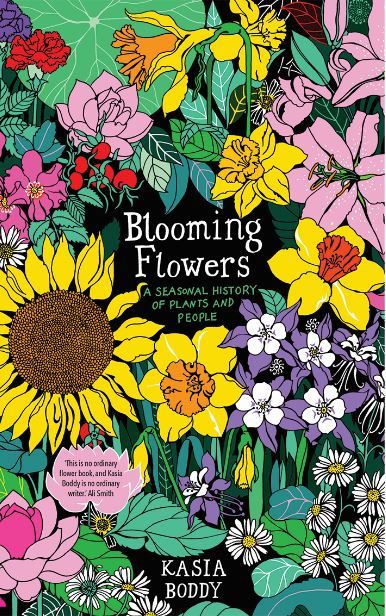
Kasia Boddy teaches American literature at the University of Cambridge. Her books include Boxing: A Cultural History, The American Short Story Since 1950, and Geranium. Her latest book Blooming Flowers, about the cultural history and significance of flowers, is out now. Read on to find out how to win 10 copies for your book group.
Radishes and Roses
Garden centres were among the first businesses to open when lockdown restrictions were eased in May. There were good reasons for this: plants are sold outdoors where the risk of infection is reduced and the horticultural industry was collapsing under the weight of unsold summer bedding. Shoppers too were excited. After weeks of (buying, perhaps even baking) bread, we wanted some roses too.
Well, some of us did. Much of the interest in gardening that sprouted during lockdown focused on growing vegetables as large numbers of people resolved, more or less realistically, to feed themselves and their families. Gardeners were told (as they always are) that it didn’t matter whether they measured their gardens in rolling acres, raised beds or yogurt pots. The urge to cultivate carrots and radishes was partly due to persistent comparisons between the Covid-19 pandemic and the two twentieth-century world wars.
But talk of #cornonavictorygardens (like evocations of an ingrained blitz spirit) is largely misguided. Things are very different now. For those of us who ‘ live in the rich world ’, the food supply chain was only minimally effected. Moreover, if we really had to rely on our own produce, it’s clear that we’d struggle to last the week. As the ethnobotanist James Wong pointed out, the average British garden is just over 3.7 square metres. ‘So,’ he concluded, ‘even assuming that, as a first-timer, you could give professional agronomists a run for their money and produce identical yields to industrial farms, this would give you enough calories for only around 5 days.’
Perhaps then it’s worth making a detour to the ‘non-essential’ section of the garden centre, the section full of zinnias, marigolds and geraniums, where sweet peas offer scent and sunflowers dazzling height and colour. In doing so, we might demonstrate another kind of blitz spirit. For even at the height of the ‘Dig for Victory’ campaign, the British gardening press urged readers not to neglect flowers – reminding them how important it was to ‘brighten’ their homes but also their ‘mental outlook’.

The original version of this argument is ancient: it’s sometimes attributed to the prophet Muhammad, and sometimes to the Greek physician Galen. One of them is said to have declared that ‘He who has two cakes of bread, let him dispose of one of them for some flowers of narcissus; for bread is the food of the body, and the narcissus is the food of the soul.’ It’s a sentiment that has been repeated at different times in many different places, with reference to all sorts of flowers. It tells us that we shouldn’t have to choose between dumplings and cherry-blossoms (as a popular Japanese saying has it) or, in the language of Dickens’s Hard Times, between facts and the fancy of walking ‘upon flowers in carpets’. Can’t we have both? Don’t we need both?
The ancient Greeks imagined the good life as ‘a bed of roses’, but it wasn’t until the twentieth century that people began to insist that such sweet-scented luxury should be available to all. The conjunction of roses with bread was first made by Helen M. Todd, a Chicago factory inspector, in a 1910 speech in favour of women’s suffrage. Todd imagined a time ‘when life’s Bread, which is home, shelter and security, and the Roses of life, music, education, nature and books’ would be the ‘heritage of every child’. The following year James Oppenheim wrote a poem which turned this argument into a rallying cry – ‘Yes, it is bread we fight for – but we fight for roses, too!’.
Set to music, most recently by Mimi Fariña, ‘Bread and Roses’ has been sung ever since, in the name of many different causes. Today, the sentiment is as relevant as ever. Never mind ‘Keep Calm and Carry On’. As we cheer the NHS and imagine what a post-pandemic world could be like, let’s make sure that as well as bread, and radishes, we’ll all have roses.
The competition
This competition is now closed


